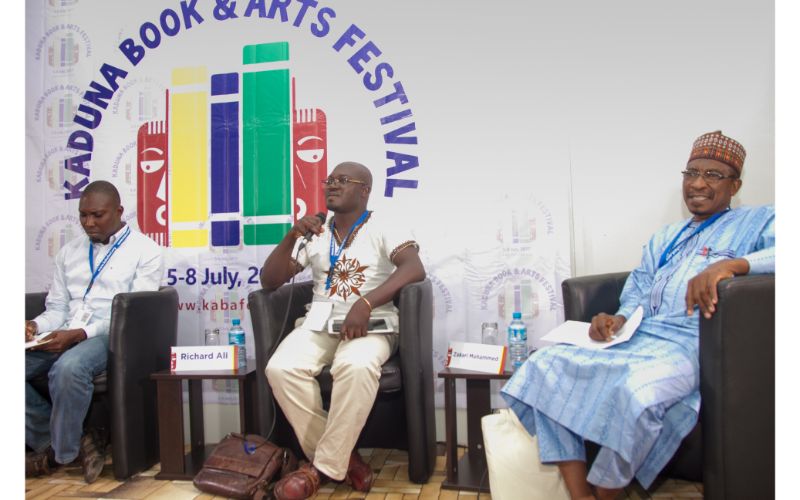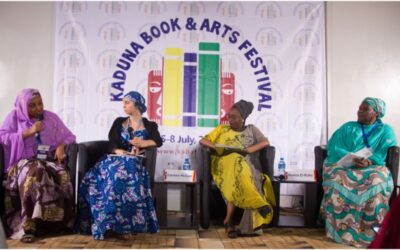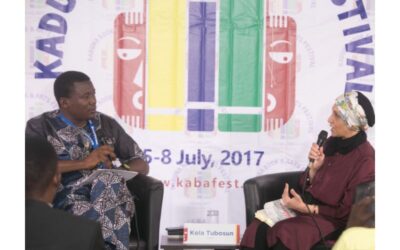Challenges of Publishing in Northern Nigeria
The panel discussion on the challenges of publishing in northern Nigeria was moderated by Richard Ali. He gave a brief overview of the reading and writing enterprise in northern Nigeria. His discourse was centred on modern publishing and its prospects. The other panellists were Nur’din Busari and Abdullah Dona. Both of them run renowned publishing houses in northern Nigeria. Nur-din Amabs books sit in Suleja, Niger State and is arguably the biggest private independent bookstore and publishing house in northern Nigeria. While, Abdullah is a veteran actor in the publishing sector and works with Ahmadu Bello University Press.
The conversation started on a polemical note, both speakers tried to capture the strength of the publishing industry in northern Nigeria. Abdullahi Dona was able to establish that there is a huge reader base of Hausa/Soyaya Novels amongst Hausa women. He cited the thriving Kano women literature to buttress his point. He dazzled the audience by sharing the experience of a young female writer he encountered in Kano who was sponsored by her father in her writing career with her school fees to self-publish. She was able to recoup her fees back with profit and has eleven books to her name.
He argued that there is a huge market for books in Northern Nigeria. But, queried the standard of available publishing houses in the north and the quality of their output. Especially, the Kano market literature will do better if there is a better structure in place to take care of these lapses. He debunked the fallacy that the north is not a reading population. He argued that solving this debacle is premised on answering the question: why do people read? This is because there is a lot of reading going on. A bulk of this reading population takes reading as a utilitarian affair.
A comment from the floor advised that the formation of the literary agency and literary agent can salvage the dwindling fortunes of literature and books in northern Nigeria. He said that will also be a way of creating employment for English graduates. He stressed that the quality of works are poor because authors are overburdened with the craft of writing and that of also promoting their books. This has affected the quality of their output.
This agency can also help in identifying and nurturing talents. This will help in the number of authors that will emerge from the north. He also identified the fact that authors must approach their work with their target audience at heart. He then called for simplicity in language and linearity of plot from new writers. The busy nature of modern life does not allow readers to entertain complexity, which he noted was way of giving caution to aspiring writers.
Nur-din identified the lack of patronage of northern books by the northern readership as another problem. He also argued that religious misrepresentation among the northern population works against any book that challenges the status quo.
He decried the absence of children literature in northern Nigeria by northern authors. This has created a gap that was supposed to provide a blueprint for the developmental stages of children’s minds. He announced that his publishing outfit Amaab Books are in the market looking for manuscripts and authors willing to undertake the task of writing Children Literature.
He praised the women for being the champions of the renaissance of literature in northern Nigeria. Women in the north he claimed have proven over time to be voracious readers. He said women in northern Nigeria were usurping economically, in readership, writing and craftsmanship the male roles in Northern Nigeria. He also applauded the fact that indigenous authors who were inspired by the pacesetters series were able to emulate its spark and magic in their writing. It is by this concrete steps that the reading culture can gain grounds in society again.
Though he queried poor legislation and taxation as affecting the publishing industry in northern Nigeria; he called on government to make better legislations that will help the plight of publishers. He mourned the dead of the theatre culture and how it has affected playwrights.
Written By Katung Kwasu



Comments are closed.